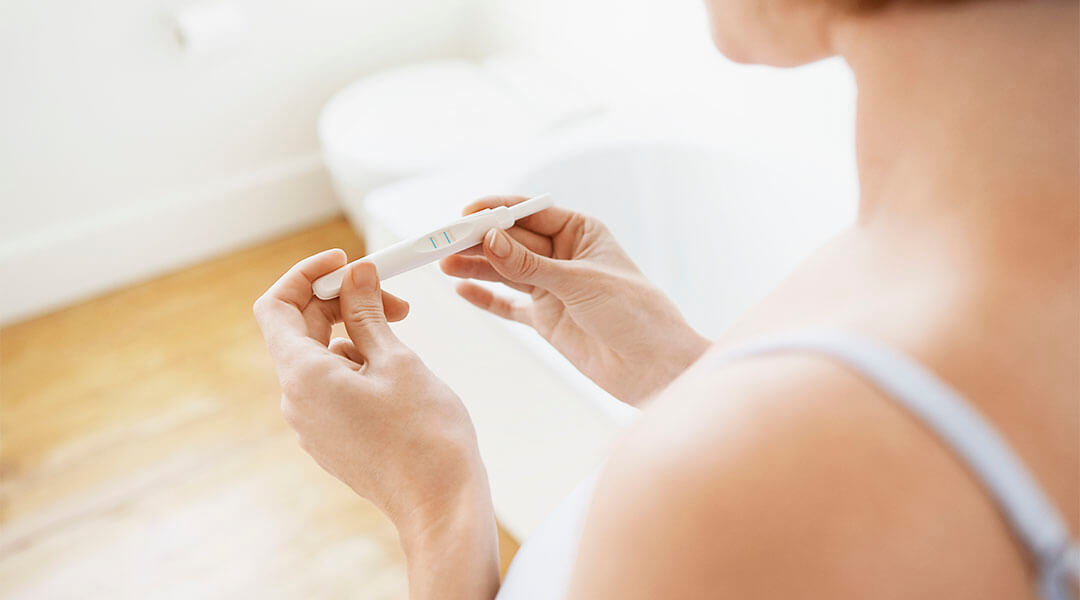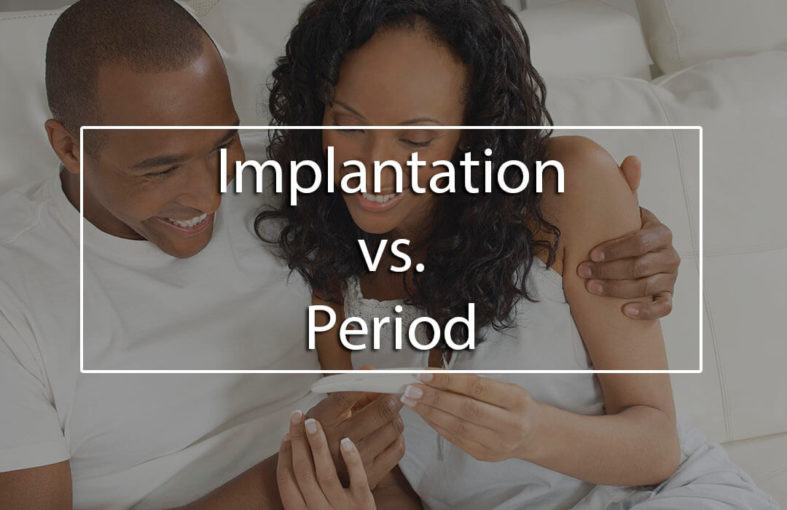Implantation vs. Period (Are You Pregnant or Just Having the Period?)
Is it implantation bleeding or are you on your periods? How can you tell the difference between your period cramps and implantation cramps? If you are cramping and periods are nowhere in sight, does that mean you are pregnant? In the battle of implantation vs. period, are you sure it is your period cramps and not the other way around?
Well, at an early stage of pregnancy, it is impossible to tell whether the symptoms you are experiencing are associated with pregnancy or not. While in certain cases, it may signs toward pregnancy, in other cases, it may just mean that your periods are on its way.
However, we will help and explain the difference between the two. We will explain the identification features, bust some myths and help you know what’s actually happening with your body. Let’s get straight to the point.
Toggle For Table Of Content
What is Implantation Bleeding?

Implantation bleeding generally occurs when 6 to 12 days old fertilized egg attaches to the interior lining of the uterus. The movement of the egg can result in light bleeding which is completely normal and does not require any kind of medical attention.
In general, 1 in every 3 pregnant women experiences implantation bleeding. A majority of women get confused and think whether it is implantation bleeding or early period. However, the two differs a lot and it is important that you do not confuse them.
How to Tell if it’s Implantation Bleeding?
Some sign and symptoms will help you know whether it is implantation bleeding or you are on your periods. The implantation bleeding symptoms includes:
Early bleeding
Implantation bleeding generally occurs a few days before your due menstrual cycle. However, this is not always the case and women end up confusing the two.
Unusual colored discharge
The implantation bleeding produces an unusual colored discharge which varies in color. The discharge can be very pinkish or can even be dark red.
Light bleeding
The length of a menstrual cycle generally varies anywhere between 3 to 6 days. However, implantation bleeding can occur only for a few hours. Moreover, throughout the day, a woman can experience just a streak of discharge as opposed to the period when the discharge is heavy.
Clotting
While some women experience heavy clotting during their menstrual cycle, others don’t see much. However, if you are implantation bleeding, there won’t be any clots present.
Toggle For Related Popular Posts
Implantation vs. Period - Difference Between Implantation Bleeding and Period

So, in the implantation bleeding vs. period game, how can we differentiate between the two? The biggest ways to tell whether it is implantation bleeding or early period it to know the timing, flow and the color of blood you are seeing.
The blood
The blood flow, as well as the color of the blood, can provide you with some answers. Implantation bleeding looks different than menstrual bleeding as the blood may be darker than the menstrual blood. The color of implantation bleeding can vary from pink to brown; on the other hand, menstrual blood is red.
Moreover, the amount of bleeding is very light in implantation bleeding as compared to period bleeding. This is considered as the primary difference between the two as the bleeding stays light and generally occurs for few hours only. Once you see the discharge, you will understand that difference between implantation bleeding or early period.
Timing also varies
If you suspect that you are having implantation bleeding, then you must note the timing you last had sex. Implantation of the egg generally occurs from 6 to 12 days after ovulation. Therefore, it puts you near the time of your menstruation cycle in a majority of cases. So, in case, it’s been a month you last had sex, there are low chances that you will be experiencing implantation bleeding.
One of the easiest ways to find out whether you are pregnant is to wait for a few days and then take a pregnancy test at home after the implantation bleeding has stopped.
Cramping
There is a similarity between implantation and period. Both menstruation and implantation bleeding cause pain and cramping. This is because of the fertilized egg “burrows” and attaches itself to the uterine lining that can cause the uterine muscles to contract thus leading to cramping.
Other symptoms
There are plenty of other symptoms associated with implantation and period that may help you identify the difference. One of the most identifiable symptoms associated with pregnancy is morning sickness.
If you are feeling nausea first thing in the morning, it may be a sign of pregnancy and is never associated with menstruation. Morning sickness may even be triggered by certain smells such as garlic, meat or pets.
Tenderness in the breasts is also a sign of pregnancy in women who generally don’t experience soreness in the breast during menstruation. While some other symptoms may be difficult to gauge, they generally sign for pregnancy or may be premenstrual syndrome (PMS).
Sharing Is Caring

Like what you read so far? How about help us to spread this AWESOME post to your friend and family? Your shout-out will help to motivate us to create more great posts for you and everyone else. Thanks for your support!
Check out this post for 'Implantation vs. Period (Are You Pregnant or Just Having the Period?)' @baby_dot_dot
How Long After Implantation Does hCG Rise?
While a blood pregnancy test generally shows positive results 3 to 4 days after implementation, a urine pregnancy hCG test may take 4 to 7 days to show positive results after implantation.
The home pregnancy test generally checks for the presence of human chorionic gonadotropin, which is a pregnancy hormone in the urine. hCG is made up of implanting blastocyst and typically appear in the maternal blood after 9 days of ovulation. The range varies typically from 6 to 12 days. The blood hCG level is at its peak at 7 to 10 weeks; however, they experience a drop in their level after that.
How Long Can Implantation Bleeding Last?

The earliest implantation bleeding can occur within 3 to 4 days of ovulation. However, you can experience the bleeding anytime between first twelve days. While the bleeding initially lasts for only a couple of days, the length of bleeding can vary in each woman.
Implantation bleeding is only noticed once or twice during the early pregnancy and is often considered as the first sign of pregnancy even before the test has been taken.
The length of implantation bleeding timing depends on the amount of blood released during the attachment process and how long will it take for the body to get rid of it. Therefore, the time can vary from a few hours to a couple of days or the bleeding may not occur at all. There is no definite answer in this case.
Can Implantation Bleeding be Heavy?
Women in the childbearing age get worried when they experience spotting before their menstruation. In some instances, a woman can experience heavy bleeding; however, such heavy discharge is not normal.
Normal implantation bleeding is light and its color varies from pink to brown. If you are experiencing heavy bleeding with cramps, make sure to get in touch with your doctor.
Implantation Bleeding Complications
Implantation bleeding is not a cause for concern as it is a sign that the uterus is making way for the embryo to grow. However, women who still are confused whether they are experiencing implantation bleeding or whether it is menstrual bleeding can choose to take a pregnancy test to find out whether they are pregnant or not.
Experiencing heavy bleeding during pregnancy is a cause of concern; therefore, if you are experiencing heavy bleeding, you should seek medical attention immediately.
Heavy bleeding may be a cause of serious complications, such as:
- A miscarriage, which is loss of pregnancy
- A molar pregnancy, which is a symptom of development of the noncancerous tumor.
- An ectopic pregnancy, where the egg is implanted somewhere other than the uterus and need medical intervention immediately.
Conclusion
You should never ignore your body’s signals or delay visiting a gynecologist if you experience abnormal symptoms. While you may be experiencing early pregnancy implantation symptoms, it is essential to visit your doctor to be sure of the situation.
We hope this article has helped you clear some doubts and made it easy to differentiate the implantation vs. period signs. If you are experiencing implantation bleeding and are indeed pregnant, big congratulation from our side!!


